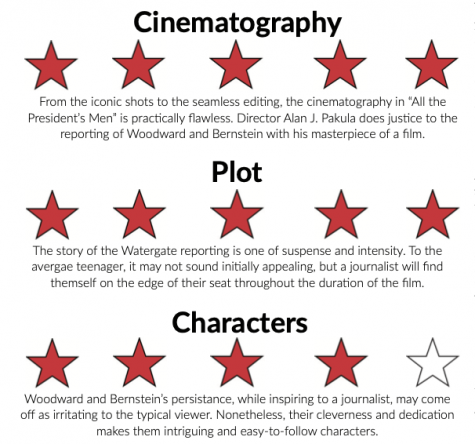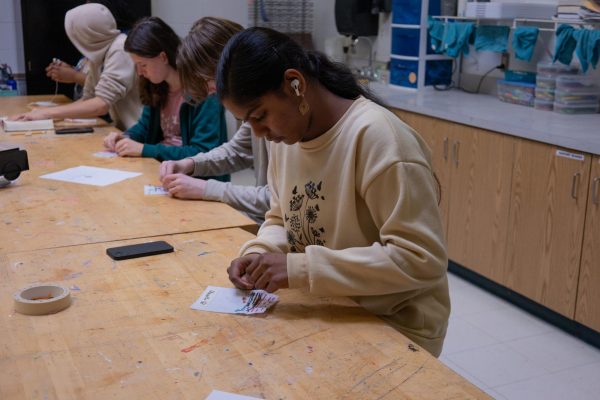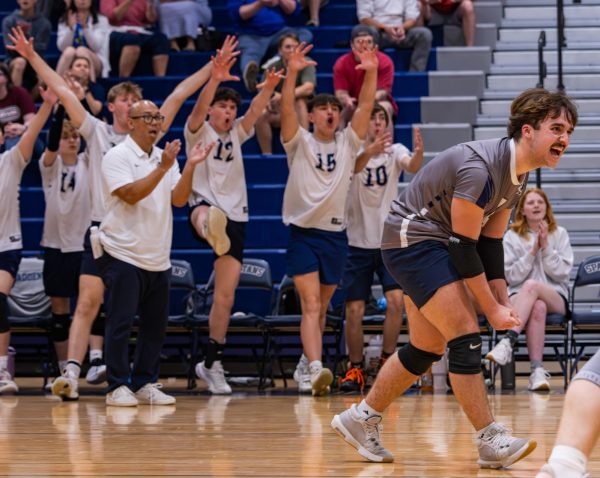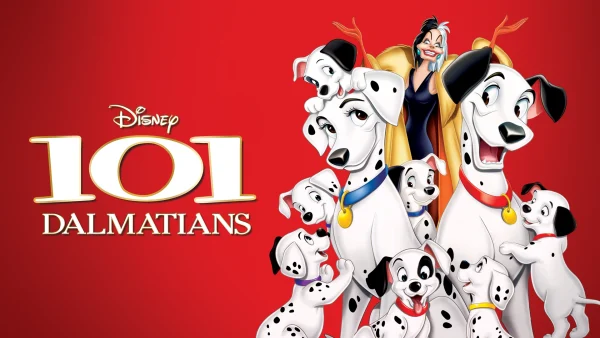All the Journalists’ Inspiration
The film that motivates me to be a better journalist
Woodward and Bernstein, played by Robert Redford and Dustin Hoffman, pose for a movie poster. Throughout the film, the dynamic duo shows their immense dedication and tenacity.
In my sophomore year, my Newspaper advisor, Mr. Schott, announced that my Journalism class would be watching “All the President’s Men,” a film about two reporters who broke the story of the Watergate scandal. Though I loved journalism, spending a week watching a movie from the 70’s about a couple of white guys who investigated a now ancient political scheme was not an idea that initially piqued my interest. Once the opening scenes rolled, my preconceptions were immediately dismissed — my apathy and indifference were replaced with intrigue and fascination.
The film begins with a shot of a typewriter, gently clacking as the buttons press blueish-black ink into the shape of letters. The camera pans over to the Democratic National Committee building; a security guard is monitoring the halls and comes across a door, slightly ajar with tape covering the latch so it won’t lock. Five men are found in one of the rooms, each wearing gloves and acting indubitably suspicious.
Bob Woodward, a young Washington Post reporter, is assigned to the story. Immediately, his persistence is palpable. He follows his gut instinct, one that leads him to break one of the greatest journalistic stories of all time.
Woodward is paired up with Carl Bernstein, a more seasoned writer. Each show strengths in different areas; Woodward is seen as the betterreporter, and Bernstein the better writer.
Together, they create an unstoppable force of journalism. Nothing stops them. Doors slammed in their faces, thousands of library checkout cards, insistence from government officials that their reporting is unfactual and unsound — even a severe lack of sources willing to go on record — does not keep them from reporting on what they know to be an important story.
This perseverance proves to be worth it; Woodstein (that’s the combined name given to them in the movie) deliver the most important piece of journalism in history, they become the inspiration for journalists for decades to come.
During our paper’s last news cycle, Mr. Schott’s journalism class was watching “All the President’s Men.” As I sat at a computer working onfinishing the paper, I listened in on the film, giving an occasional glance to the smartboard to admire the cinematography. It was my fourth timeseeing the movie in room 139, though I had seen it upwards of a dozen times on my own. The film’s action was coming to its peak; Woodward had discovered the names of the people involved in the Watergate scandal, meaning he and Bernstein would be able to complete their article and have it published in the morning’s paper.
As I watched, I couldn’t help but smile: a genuine, joyful, ecstatic grin was plastered onto my face as I worked on my Indesign documents. Despiteknowing the outcome of the film, its suspense was almost tangible. Even after seeing it numerous times, I was still on the edge of my seat.
 When I’m overloaded with work putting this paper or I’m struggling to finish a story or spread, “All the President’s Men” reminds me why I love journalism. It is trying and difficult and demanding, but that is what makes it so amazing.
When I’m overloaded with work putting this paper or I’m struggling to finish a story or spread, “All the President’s Men” reminds me why I love journalism. It is trying and difficult and demanding, but that is what makes it so amazing.
Woodstein’s story urges me to be the best journalist I can. It is my biggest desire in life to be as persistent, dedicated and confident in my journalismas they were. Whether it’s a simple news update or the next Watergate, I strive to give each project my all. “All the President’s Men” inspires me to be as curious, tenacious and determined as the duo it follows; only then will I be the journalist I want to be, the best journalist possible.
Your donation will support the student journalists of Francis Howell Central High School. Your contribution will allow us to purchase equipment and cover our annual website hosting costs. FHCToday.com and our subsequent publications are dedicated to the students by the students. We hope you consider donating to allow us to continue our mission of a connected and well-informed student body.













Lisa • Jun 26, 2021 at 6:54 am
Kayla,
You have a terrific writing style and a journalist’s instinct! Many people aren’t aware of how the Watergate scandal is connected to the JFK assassination, and their is a book about one of the first female investigative reporters I think you would enjoy. Good luck!
https://www.amazon.com/Reporter-Who-Knew-Too-Much-ebook/dp/B01MCWSLEC/ref=tmm_kin_swatch_0?_encoding=UTF8&qid=&sr=
Kayla • Oct 17, 2022 at 7:18 pm
Thank you! I graduated in 2021 and just noticed this comment. I will definitely check out that book!